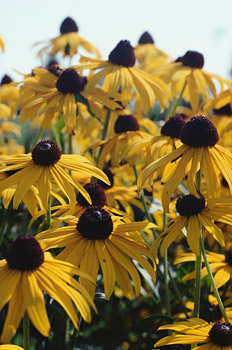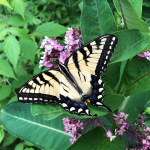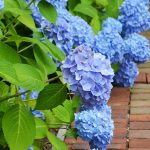Gardens
Project Native: Growing Native Plants
“Nobody is a better landscaper than nature,” states Raina Weber, dirt-streaked and beaming, from her Housatonic, Massachusetts, native-plant nursery. It’s hard to believe that this hardworking young woman, executive director of the nonprofit Project Native, dropped out of high school and ran away to Hawaii, where she supported herself as a caretaker and by selling […]

Coffee By Design | Portland, Maine
Photo Credit : Katherine Keenan “Nobody is a better landscaper than nature,” states Raina Weber, dirt-streaked and beaming, from her Housatonic, Massachusetts, native-plant nursery. It’s hard to believe that this hardworking young woman, executive director of the nonprofit Project Native, dropped out of high school and ran away to Hawaii, where she supported herself as a caretaker and by selling exotic fruit trees she had grown from seed. What started as a teen adventure blossomed into a career.
Returning home to New England after 18 months, Raina found work as a landscaper, putting her hands in the soil as she has loved doing since the age of 9. Her days off found her exploring wild meadows and river wetlands. An “oh, wow” moment occurred when she came upon a colony of orchids — pink lady’s slippers. Finding nary a native plant at local garden centers, Raina took a cue from her Hawaiian foray. “I began collecting seeds of the plants discovered on my walks and decided to start a nursery,” she says.
Enter Raina’s childhood friend Amanda Root, founder and former director of the Railroad Street Youth Project (RSYP), which grants assistance to projects designed by kids for kids ages 14 to 25. Raina’s idea of a native-plant nursery fit right into RSYP’s mission.
Then Amanda’s grandfather, Stephen Root, offered land next to his orchard, rent free, to the fledgling nursery. With seeds collected from the wild, 19-year-old Raina and assistant Carrie Petrik installed a greenhouse for 25 perennial species native to the Berkshire Taconic region — 2,000 plants in all.
The Berkshire Environmental Fund, among others, enabled the pair to build a second greenhouse, increasing stock to 4,000 plants, 30 varieties. Disaster struck in the third year when an ice storm destroyed the new greenhouse, plants froze, and mice ate their cache of collected seeds. Then, Raina recalls, “on top of everything else, Steve Root needed to put his land back into cultivation.”
Nearly ready to close down the nursery, Raina got a phone call from the director of the Berkshire County division of The Nature Conservancy. He had good news: Fans of Project Native wanted to help. As Raina puts it, “the angels arrived” in the form of a local couple who purchased the 54-acre tumbledown Maple Shade Farm. She also credits the 70 volunteers who helped clean up the farmhouse and the land.
Today, Project Native is bustling at the former farm property, with two greenhouses and the start of a seed bank for the nursery. The property’s old roadside milk parlor was renovated and houses a garden shop. The nursery sells 150 varieties of native wildflowers, ferns, blooming shrubs, grasses, small trees, and wetland restoration plants. Clients include homeowners, landscapers, garden designers, garden centers, schools, educational programs, and nonprofits.
The nursery’s catalogue is a great resource for designing different types of gardens, such as meadows or wildflower fields. And the crew at Project Native is available for consultation on native garden design, restoration, and mitigation, including wetland revival.
Project Native, 342 North Plain Rd., Housatonic, MA. 413-274-3433; projectnative.org
For another resource about wildflowers : Wildflower Gardening
“Nobody is a better landscaper than nature,” states Raina Weber, dirt-streaked and beaming, from her Housatonic, Massachusetts, native-plant nursery. It’s hard to believe that this hardworking young woman, executive director of the nonprofit Project Native, dropped out of high school and ran away to Hawaii, where she supported herself as a caretaker and by selling exotic fruit trees she had grown from seed. What started as a teen adventure blossomed into a career.
Returning home to New England after 18 months, Raina found work as a landscaper, putting her hands in the soil as she has loved doing since the age of 9. Her days off found her exploring wild meadows and river wetlands. An “oh, wow” moment occurred when she came upon a colony of orchids — pink lady’s slippers. Finding nary a native plant at local garden centers, Raina took a cue from her Hawaiian foray. “I began collecting seeds of the plants discovered on my walks and decided to start a nursery,” she says.
Enter Raina’s childhood friend Amanda Root, founder and former director of the Railroad Street Youth Project (RSYP), which grants assistance to projects designed by kids for kids ages 14 to 25. Raina’s idea of a native-plant nursery fit right into RSYP’s mission.
Then Amanda’s grandfather, Stephen Root, offered land next to his orchard, rent free, to the fledgling nursery. With seeds collected from the wild, 19-year-old Raina and assistant Carrie Petrik installed a greenhouse for 25 perennial species native to the Berkshire Taconic region — 2,000 plants in all.
The Berkshire Environmental Fund, among others, enabled the pair to build a second greenhouse, increasing stock to 4,000 plants, 30 varieties. Disaster struck in the third year when an ice storm destroyed the new greenhouse, plants froze, and mice ate their cache of collected seeds. Then, Raina recalls, “on top of everything else, Steve Root needed to put his land back into cultivation.”
Nearly ready to close down the nursery, Raina got a phone call from the director of the Berkshire County division of The Nature Conservancy. He had good news: Fans of Project Native wanted to help. As Raina puts it, “the angels arrived” in the form of a local couple who purchased the 54-acre tumbledown Maple Shade Farm. She also credits the 70 volunteers who helped clean up the farmhouse and the land.
Today, Project Native is bustling at the former farm property, with two greenhouses and the start of a seed bank for the nursery. The property’s old roadside milk parlor was renovated and houses a garden shop. The nursery sells 150 varieties of native wildflowers, ferns, blooming shrubs, grasses, small trees, and wetland restoration plants. Clients include homeowners, landscapers, garden designers, garden centers, schools, educational programs, and nonprofits.
The nursery’s catalogue is a great resource for designing different types of gardens, such as meadows or wildflower fields. And the crew at Project Native is available for consultation on native garden design, restoration, and mitigation, including wetland revival.
Project Native, 342 North Plain Rd., Housatonic, MA. 413-274-3433; projectnative.org
For another resource about wildflowers : Wildflower Gardening







